Mıgırdiç Civanyan
Mıgırdiç Civanyan (Armenian: Մկրտիչ Հովհաննեսի Ճիվանյան, 1848 in Constantinople, Ottoman Empire - February 14, 1906 in Istanbul, Ottoman Empire) was an Ottoman painter of Armenian descent.[1]
Mıgırdiç Civanyan Մկրտիչ Ճիվանեան | |
|---|---|
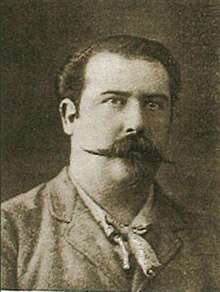 | |
| Born | 1848 Beşiktaş, Constantinople, Ottoman Empire |
| Died | February 14, 1906 (aged 57) Istanbul, Ottoman Empire |
| Occupation | Painter |
Life
Mgirdic Civanyan was born in the Beşiktaş district of Constantinople in 1848.[2] His father Ohannes, was a violinist for Sultan Abdulmecid.[2] His younger brother Harutyun was also a painter. In the 1860s, Civanyan studied under Abraham Sakayan, another Ottoman Armenian painter.[2] Civanyan continued his studies at the Academy of Fine Art in Beyoğlu district of Istanbul under the guidance and teachings of the French painter Pierre Guillemet, who opened the academy. In 1874, he met with famed Russian-Armenian painter Hovhannes Konstantinovich Aivazovsky, whose work inspired Civanyan to incorporate much of the love for the sea into his own paintings. Having known Italian, Civanyan went to Italy in 1876 and remained there until 1879.[3] Upon returning to Istanbul, he married an Italian woman in 1885. However, his wife died after four years of marriage. His second marriage was with another Italian thus bringing him closer to the Italian community of Constantinople. Due to the Hamidian Massacres of Armenians, Civanyan sought refuge in Odessa in the spring of 1894. After living in Odessa for seven years, Civanyan moved to St. Petersburg for another four years. He then moved back to Istanbul in the summer of 1905 and died suddenly on February 14, 1906. Civanyan is believed to have created an estimated 1000 pieces of art work throughout his lifetime.[3]
Style and Subject Matter
Mıgırdiç Civanyan is known for painting landscapes of Constantinople, especially that of the Bosphorus. Civanyan usually paints with such materials as thin canvas, wood, cardboard, tin plate which shows that he preferred cheap, non-textured, hard, and rigid background surfaces.[3] Therefore, it is assumed that he painted mainly for the middle class rather than the upper class.
Gallery
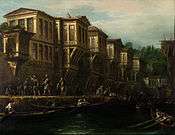 Said Paşa Waterfront Mansion
Said Paşa Waterfront Mansion_-_A_Coffee_House_in_Tophane_-_Google_Art_Project.jpg) A Coffee House in Tophane
A Coffee House in Tophane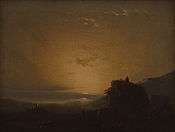 Sunset on the Sea
Sunset on the Sea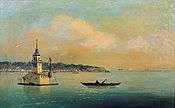
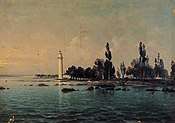
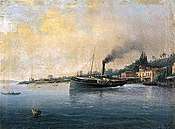
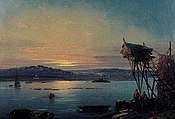
References
- Kurkman, Garo (2004). Armenian painters in the Ottoman Empire 1600-1923. İstanbul: Matüsalem Publications. ISBN 9789759201555. Retrieved 28 November 2012.
- Tarih ve toplum: aylık ansiklopedik dergi (in Turkish). Indiana University. 1990. p. 100. Retrieved 28 November 2012.
- Kurkman, Garo (August 3, 2006). "100 years after his death, Istanbul Painter Migirdiç Civanian". O.I.A.: Online News Article. Archived from the original on 5 August 2006. Retrieved 28 November 2012.